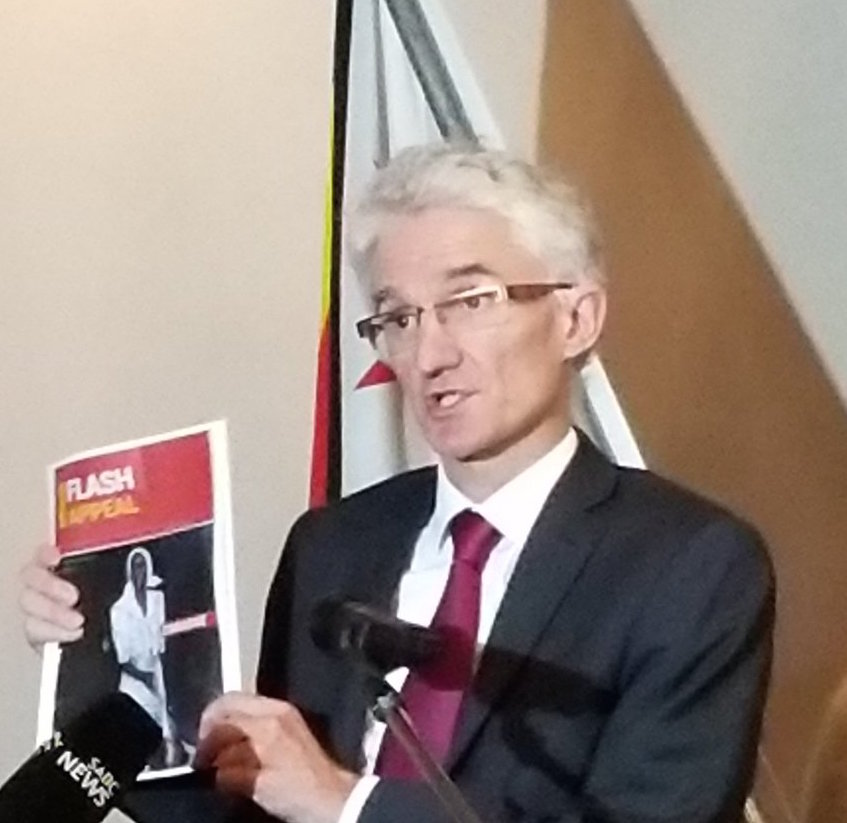The United Nations together with the Government and partners today launched a Humanitarian Flash Appeal requesting for USD 234 million targeting 2.2 million people of the nearly 5.3 million Zimbabweans who need assistance until June 2019.
The Humanitarian Flash Appeal presided over by the visiting UN Under-Secretary General for Humanitarian Affairs and Emergency Relief Coordinator Mr Mark Lowcock, was launched yesterday (28 February 2019) in Harare in response to rising humanitarian needs in the country due to poor rains and a challenging economic situation.
Launching the Appeal, Mr. Lowcock said, “to enable humanitarian agencies to provide time-critical and multi-sectoral assistance – including food, health, nutrition, water and sanitation, and protection – in both urban and rural areas, I have released USD 10 million from the UN Central Emergency Response Fund (CERF) to assist over 270,000 people in the 11 most-affected districts.”
The Humanitarian Flash Appeal aims to:
- Save lives and livelihoods by providing integrated humanitarian assistance and protection to people impacted by the economic crisis and severe food insecurity,
- Provide life-saving humanitarian health assistance by responding to outbreaks and procuring essential medicines,
- Build resilience of the most vulnerable communities to mitigate against the impact of the deteriorating economic situation.
Noting that the Flash Appeal complements the Government’s ongoing and planned interventions and emphasising on the need to adhere to humanitarian principles in relief distribution, and to ensure the right to adequate food and nutrition and health services of all people, Mr. Bishow Parajuli UN Resident Coordinator in Zimbabwe said, “The Flash Appeal targets hardest-hit districts, including rural and urban, which were prioritised through severity ranking based on multi-sectoral analysis of humanitarian needs in food; health; nutrition, water and sanitation; child protection as well as the human rights of women and girls that are at risk of violence and abuse due to economic stress and food insecurity .”
The Appeal also includes the procurement of essential medicine and medical supplies to cover 9.2 million vulnerable people in 80 districts who currently have limited access to healthcare and to allow children remain in school through provision of food and nutrition supplements.
Of the USD 234 million appeal: USD 130 million for food security; USD 11.1 million for agriculture; USD 37.4 million for health; USD 12.7 million for water, sanitation and hygiene; USD 4.5 million for child protection; USD 16.5 million for early recovery; USD 9.7 million for education; USD 8.7 million for nutrition; and USD 3.2 million for refugees.
Underlining the Government’s commitment to find long-term solutions to prevailing vulnerabilities by focusing on sustainable development and resiliency, the Chief Secretary to President and Cabinet said, “limited fiscal space has constrained the Government’s intention to provide assistance to all households in need, I am therefore thankful to the United Nations and its humanitarian partners for the timely multi-sectoral Flash Appeal to scale-up support to the vulnerable households complementing Government’s efforts.”
Urging partners and stakeholders to collaborate to provide holistic response to reduce vulnerabilities across the country, the Chief Secretary said, “the Government of Zimbabwe is committed to do so transparently and accountably.”
In response to the Humanitarian Flash Appeal, US Ambassador to Zimbabwe His Excellency Brian A. Nichols said, “The United States is providing an additional USD15 million to respond to increased humanitarian needs in Zimbabwe. We are proud to work with the United Nations, and non-governmental organizations, to deliver this assistance quickly and efficiently to the communities and people who need it most.”
Various other Ambassadors including that of South Africa, H.E. Mr. M. N. Mbete; Sweden, H.E. Ms. Sofia Calltorp; Head of the European Union Delegation, H.E Timo Olkkonen; and the Head of United Kingdoms’ Department for International Development, Ms. Annabel Gerry also delivered solidarity messages in support of the Humanitarian Flash Appeal.
H.E. Ms. Sofia Calltorp said, “Sweden recognizes that there is a growing number of people in urgent need of humanitarian assistance. In this context, Sweden highlights the need for stabilization of Zimbabwe’s political and socio-economic environment. It is crucial that policies are introduced alongside humanitarian assistance to avert further need for action in the future.”
H.E Timo Olkkonen said, “The European Union stands by the people of Zimbabwe and remains concerned about the worsening of the humanitarian situation. This appeal comes at the right time and we hope that all parties involved in the response will be able to help to find a rapid, well targeted and efficient outcome.”
“The United Kingdom along with the rest of the international community wants to support the people of Zimbabwe through this difficult time. It is essential that we work together to ensure the right assistance reaches those who need it most,” said Ms Gerry echoing the commitment of the international community.
The launch of the Humanitarian Flash Appeal brought together senior representatives from Government; Diplomatic Corps; Development and Humanitarian Partners; Civil Society Organizations; Non-Governmental Organizations; Private Sector; and the Media.
The Humanitarian Flash appeal contributes to the 2030 Agenda for Sustainable Development and it 17 goals, by advancing the overarching principle of “leave no one behind” and adopting humanitarian-development and peace building nexus in support of Zimbabwe’s commitments to furthering its human rights and humanitarian obligations.
The United Nations System, through 2016-2020 Zimbabwe United Nations Development Assistance Framework, works with various partners to advance democratic, social and economic governance for quality service delivery in health, education, water and sanitation, food and nutrition, gender equality, HIV and AIDS, poverty reduction and resilience building delivering USD 400 million in various development projects towards inclusive growth and sustainable development.






